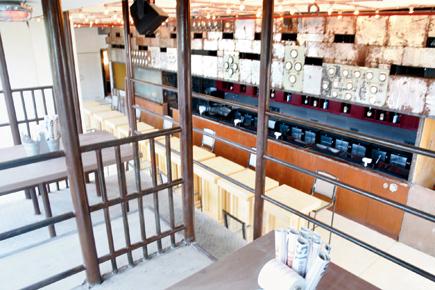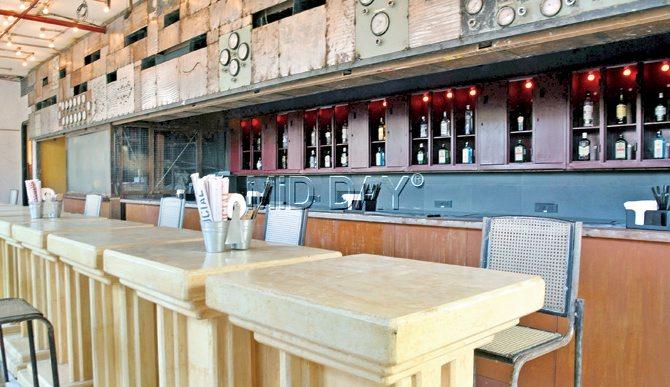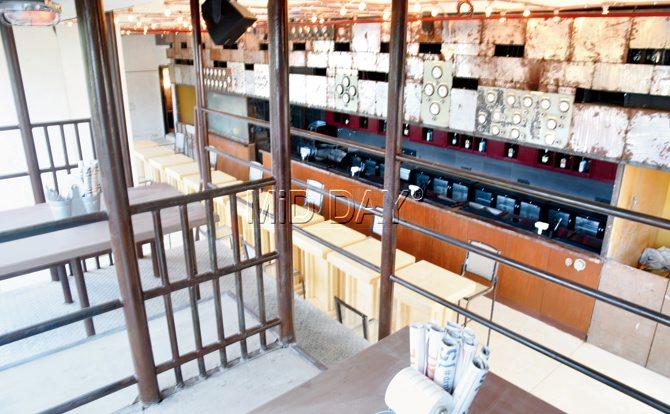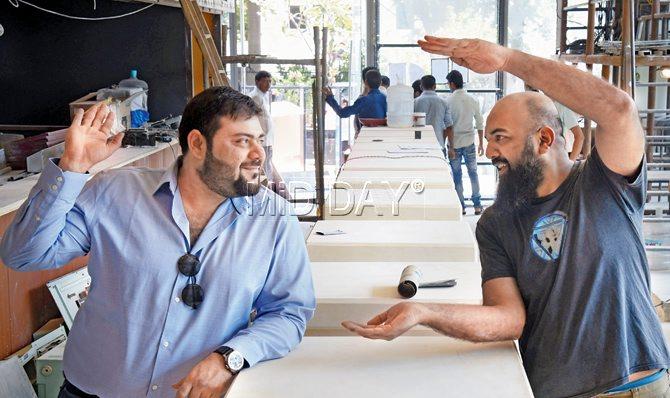You may be a socialist, communist or capitalist, but there’s a seat at Capital Social, designed by restaurateur Riyaaz Amlani and architect Ayaz Basrai, for you

Capital Social at BKC has an austere vibe inspired by Russian bunkers and and is a throwback to the World War era
This week, hospitality group Impresario, headed by Riyaaz Amlani, will launch its 10th outlet of all-day café and bar, Social, in India. Fifth in the city, it is located in the office maze of Bandra Kurla Complex. It will share its name with the G-Block building it is housed in, Capital. But its inspiration lies 5,000 kilometres away and 71 years ago in World War II
stricken Russia.

Capital Social at BKC has an austere vibe inspired by Russian bunkers and and is a throwback to the World War era. Pics/Nimesh Dave
When we walk into the near-ready 1,950 sq ft space, a jam session of drilling, cutting and polishing is underway.
Amlani and Ayaz Basrai, co-founder of The Busride Design Studio and architect for the project, are facing the wall, engrossed in conversation.
Having finally arrived at a decision regarding the lighting, Amlani turns to greet us.

The two like creating spaces, and admit that inspiration comes from things they are currently into.
We begin the interview on a disagreement. They cannot decide on their first project together from around 10 years ago — was it Venom in Kolkata or Smoke House Grill? “Arre, I met you after I returned from Dubai, where I did Manzil, that dance bar. Anyway, let’s start the story with Smoke House Grill,” Basrai says, reaching a compromise.
One thing he remembers clearly, is the first brief Amlani gave him. “It was for Smoke House Grill, and he played acid jazz for four hours. It was the best brief a design person could have asked for. It offered us the mood he was looking for.”
Collaborating with Amlani is like working with another design powerhouse, says Basrai. “He means I interfere too much,” Amlani quips.

“With him, there is potential to take a concept beyond the light and furniture,” says Basrai, giving Amlani credit for changing the way his firm approaches design. “Inputs can come from music, food, or a graphic novels you are reading. Your
experiences permeate the restaurant. If we didn’t earn this perspective early in our career, we may not have continued on the hospitality track,” says Basrai, considered one of Mumbai’s most prolific restaurant designers.
Designed from scrap
Every Social, since the first one opened in Bengaluru two years ago, dons a different look, but retains an underlying thought. “With Capital, we have created a communist vibe using a brutalist design, raw, simple and functional. It’s minimum intervention, maximum upcycling,” says Amlani, adding, “There can be three kinds of government — social, communist and capitalist — and we decided to depict all three. The space is a throwback into the Cold War era. The Russians were calling Americans capitalist pigs. The Americans were on a witch hunt to hang the commies. Both governments were trying hard to out do the other. In retrospect, it is a laughable exercise, but it was quite diabolic then.”
This brief took Basrai to the ship breaking yards of Bhavnagar in Gujarat. “While sourcing scrap in the yards, our reference point were the old Russian enigma machines that helped the Allies crack German codes and preempt strikes. I also sourced this cool handle from a BEST bus. I am now using it as a handle on a booth door. Imagine a Russian bunker in the middle of BKC — an austere, stark, Cold War look complete with bright propaganda banners. We are also going to fix TV screens on the façade, playing clips of soldiers marching and communist propaganda on loop,” says Basrai, sipping his coffee.
For the first time, a restaurant will see detachable community tables been fitted on tracks, so they can be moved and joined to accommodate large and small groups.
Fifteen years into the industry, and the challenge for Amlani is to outdo himself. The industrial vibe he made cool with Social has been replicated across restaurants in India. “More than once, we have gone for client meetings and the Social menu is lying with the client in his file [to produce as reference],” he adds.
Amlani is having the last laugh. “It forces you not to do what you did. How do I get that grungy vibe without using brick, for instance.” Basrai interrupts, “You mean ‘shabby chic’.”
And there’s more laughter.
With the food and music constant across the chain, Social Capital sits in the safety net of being a well-accepted brand. “Now we can f*** around a little bit with the design. People are copying elements from Social, but they mistake furniture for mood, which is a myopic view to take,” says Basrai.
Design, says the duo, stems from the space available. “You can’t force the same design onto every location.” Capital Social is a linear property, lending itself to mess-style community tables and bunker private spaces.
Generation bridge
How do two men, who are kids of the 70s, create a space that makes the millennials keep coming back? The 70s were about “bad haircuts, rock ‘n’ roll and rebellion”, the 80s about “towing the line, getting an MBA degree and then a job”, says Basrai. “Today, people follow Zuckerberg and Larry Page. Youngsters want to try and save the world with an app. It’s about taking your time, going on holidays and being hipster cool,” says Amlani.
And Social offers the customer that leisurely pace to return to. “When we were growing up, we kept secrets. Now, it’s about collaborating, telling the world what you do. Let them do it at Social.” Basrai agrees. “Let’s offer them a banging wifi, lockers, instead of frowning upon it.”
Cafés are India’s piazzas
And so, at Social, stewards (who you often mistake for customers) don’t glare at you for sitting too long. “In my head,” says Amlani, “Social is a café. We encourage people to linger, work. Cafés are our piazzas, where people congregate. We don’t have open spaces, so cafés have to step in, and double up as townhalls or community centres,” he adds.
That’s why, every Social has a ‘neighbourhood’ identity. Todi Social was built for professionals who live and work in Lower Parel. “Humans are addicted to being part of communities. Twitter is serving the need online. Cafés must do it offline.”
 Subscribe today by clicking the link and stay updated with the latest news!" Click here!
Subscribe today by clicking the link and stay updated with the latest news!" Click here!








